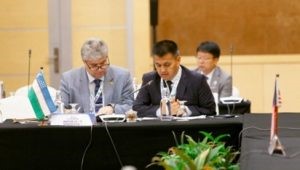The 4th World Irrigation Forum took place in Kuala Lumpur, Malaysia, from September 7 to 10, 2025. The event was organized by the International Commission on Irrigation and Drainage (ICID), a leading global scientific, technical, and professional non-profit organization in the fields of irrigation, drainage, and flood management. Established in 1950, ICID is dedicated to promoting sustainable water management in agriculture worldwide.
As of September 2025, ICID comprises 80 national committees representing their respective countries, all operating through relevant governmental or sectoral agencies. Collectively, ICID’s member network covers over 90% of the world’s irrigated land. The organization brings together more than 800 top-tier experts and specialists from various disciplines involved in the planning, development, operation, and management of irrigation and drainage systems, as well as flood control.
The main host of the 4th Forum was the Malaysian National Committee for Irrigation and Drainage (MANCID), with the support of Malaysia’s Ministry of Agriculture and Food Security.
The theme of the 4th Forum, “IS IRRIGATION A SUNSET INDUSTRY?”, addressed the escalating climate crisis, marked by more frequent extreme droughts and torrential rainfall, both of which threaten food and water security. Simultaneously, agriculture and water management face mounting economic pressures, market instability, and structural inefficiencies that impact the resilience of farmers and the sustainability of the agricultural sector as a whole.
Uzbekistan played an active role in the Forum. Vadim Sokolov, Head of the Agency for the Implementation of Projects of the International Fund for Saving the Aral Sea (IFAS) in Uzbekistan, Vice President of ICID (2024–2026), and Chairman of the Technical Advisory Council of GWP CACENA, was a key participant. Adham Tulaganov, Coordinator of the National Water Partnership of Uzbekistan, also took part remotely.
Uzbekistan has been a member of ICID since 1993. Its involvement is coordinated by the National Committee for Irrigation and Drainage under the Ministry of Water Resources.
Vadim Sokolov became the third representative from Uzbekistan to be elected Vice President of ICID, and, for the first time in the country’s history, an Uzbek representative has joined the ICID Governing Council, which consists of the President, three Vice Presidents, and the Secretary-General. In addition, Mr. Sokolov was appointed Chairman of the Permanent Committee on Strategy and Organization (PCSO) for 2025–2026, and designated Coordinator of the “Sustainable Development” strategic direction, including oversight of the Forum’s main theme (Theme 1).
More than 750 participants from 40 countries and 8 international organizations attended the Forum. Uzbekistan’s delegation was represented by Zokir Ishpulatov, Deputy Minister of Water Resources and Director of the Agency for Operation of Water Resources Facilities, along with Vadim Sokolov.
On September 9, the third day of the Forum, technical sessions were held in parallel, covering the event's four key thematic areas.
In the morning, a memorandum of cooperation was signed between ICID and the Executive Committee of the International Fund for Saving the Aral Sea (IFAS) at the ICID headquarters. The signing ceremony was attended by ICID Vice Presidents Vadim Sokolov and Bahrom Gaforzada, representatives of the Tajikistan National Committee, ICID Secretary-General R. Gupta, Honorary Vice President Mohamed Wahba, and Honorary President Chandra Madramuthu.
The memorandum outlines enhanced cooperation in ICID programs focused on sustainable development in the Aral Sea Basin. ICID leadership also proposed a meeting with the Ministry of Water Resources and Irrigation of Kazakhstan to further strengthen regional engagement.
In the afternoon, Vadim Sokolov moderated Technical Session 1.1, titled “Irrigation and Drainage Challenges for Ensuring Food Security in a Changing World.”
Later, he was a featured speaker in Technical Session 1.4, where he presented “Uzbekistan’s Experience in Integrated Agri-Food Adaptation to Climate Change.”
The Forum concluded with a closing ceremony, during which prizes and awards were presented to recognize outstanding contributions.
